The 7 Best Houseplants for Beginners, Experts Say
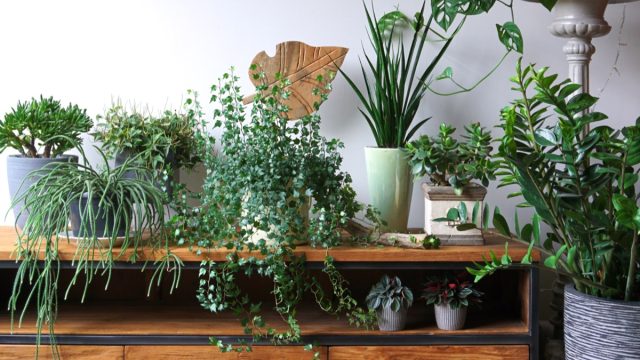
Houseplants are not only a pleasant addition to your home décor aesthetic, but also useful tools in slashing anxiety and restlessness, according to research. Studies show that working with plants can make you feel more comfortable and calm in everyday life. With that in mind, you might be interested in trying your hand at becoming a plant parent—but there are a few things you’ll want to keep in mind when selecting a new floral friend.
“If you’re looking for a splash of green in your home but are looking for a low level of commitment, you’re in luck,” Leslie Vincent, resident horticulturalist and gardening expert at Atkins Garden Shop, tells Best Life. “There’s a number of stunning houseplants available that require very little effort to maintain and are hugely difficult to kill.”
Even if you’re scarred from a houseplant that lost its life under your watch, experts say you should give it another go. Read on to find out which seven varieties they recommend picking up at your local garden center.
READ THIS NEXT: 5 Houseplants That Don’t Need Sunlight.
1
Snake plant
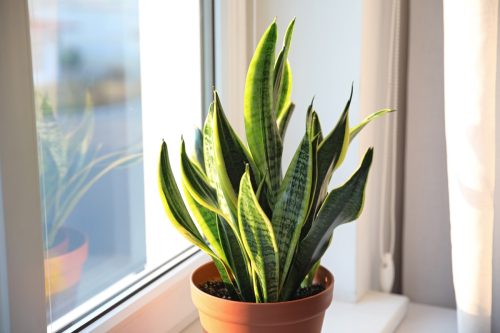
If you’re looking for a resilient houseplant, Vincent recommends seeking out a snake plant, which she says is “borderline invincible.”
These succulents are great for first-time houseplant owners, who might not be ready for a vigilant watering schedule. Also known as mother-in-law’s tongue, snake plants are actually negatively affected by too much water, Susan Brandt, co-founder of the gardening website Blooming Secrets, says.
“These require very, very little water, only give them a drink when the soil is completely dry,” Vincent adds. “Be sure to clean the leaves every once in a while in order to prevent dust from building up.”
Snake plants add value by working as “natural air purifiers,” Vincent explains. “Snake plants, like most other plants, absorb carbon dioxide but they also can absorb things like formaldehyde and benzene through their leaves. A huge plus!”
2
Spider plant
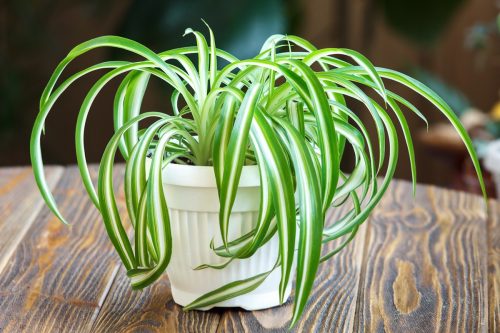
Another houseplant named for a somewhat scary creature is the spider plant, which makes a great choice for first-timers, Brandt says.
“This plant is very easy to grow and will also produce little babies or small ‘pups,'” she explains. “Each of these plantlets can be rooted in potting soil or water to start a new plant.”
Spider plants are pet-friendly and make for great hanging décor, but you’ll want to keep them in indirect light, as direct sunlight can be too hot and burn the leaves, Brandt says. And much like the snake plant, the spider variety “is a champion air cleaner.”
“NASA tests indicate the plat removes 90 percent of cancer-causing chemical formaldehyde from the air,” she tells Best Life. “It also absorbs odors and fumes, which helps keep the oxygen level high and even promotes better sleeping.”
As an added benefit, Jen Stark, master gardener and founder of Happy DIY Home, adds that they’re one of the more affordable options, suitable “for budget-minded beginners.”
For more home advice delivered straight to your inbox, sign up for our daily newsletter.
3
ZZ plant
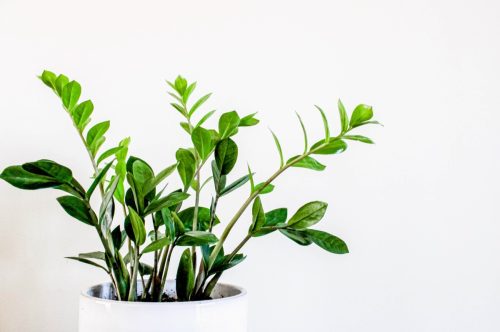
Perhaps you have a perfect spot for your first plant in your home or apartment, but it doesn’t get any light. That’s where ZZ plant comes in.
“ZZ plant tolerates very low light, which makes it great for homes that don’t have a lot of windows or are in shade,” Vladan Nikolic, founder of the houseplant care blog Mr. Houseplant, says. Brandt adds that it can even flourish “in a windowless bathroom.”
“It can go without water for weeks or even months, so it’s great for people who travel a lot or are forgetful about watering.” Nikolic adds.
4
Peace lily
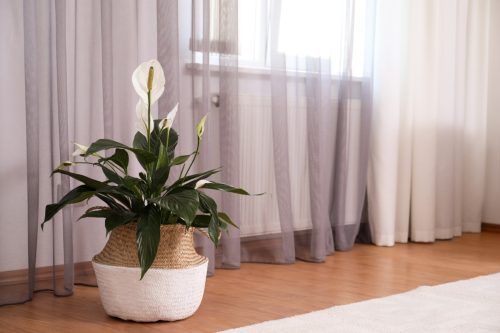
Another plant that tolerates low-light settings is the peace lily. Nikolic notes that it’ll flourish in practically any spot in your home, even if it’s not near a window.
However, similar to ZZ plant, just because peace lilies are low-light tolerant, it doesn’t mean that they enjoy low lighting, Nikolic points out. “These plants are just good at dealing with less than optimal light,” he says.
“It’s also very forgiving of watering mistakes, which is why I always recommend it for beginners,” Nikolic adds.
Shella Oaks, blogger at Grass Tasks, says that beginners might notice some positive changes when introducing a peace lily to their home. “In addition to making your house look beautiful, peace lilies are also great air purifiers; they encourage sound sleep, guard against mildew, and eliminate pollutants from the air,” she explains.
READ THIS NEXT: 7 Plants You Can Buy That Are Actually Dangerous Invasive Species.
5
Lucky bamboo
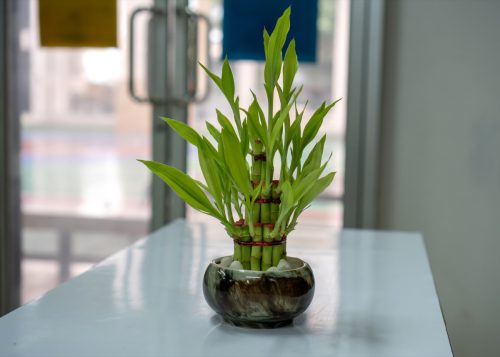
Beginners who want to invite some good fortune can seek out a lucky bamboo plant. “Lucky bamboo is an incredibly popular houseplant for a good reason,” Stark says. “It’s easy to care for, tolerant of a wide range of conditions, and incredibly attractive. Plus, it’s believed to bring good luck to those who grow it.”
Stark notes that lucky bamboo is a versatile choice for your home, as it can either be planted in soil or in a vase with water. If you don’t want to use soil, Emma Loker, expert gardener and author for DIY Garden, offers a simple solution.
“Just lay the bottom of a vase or pot with pebbles, fill it with water, and then add your bamboo,” she says. “It couldn’t be simpler to look after.”
6
Aloe vera
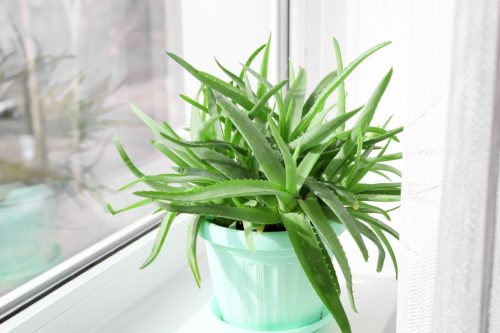
One of the houseplants experts most frequently recommended to Best Life was aloe vera. Carl Anderson, owner of Sweet New Earth, suggests the succulent as a low-maintenance option, as well as one that’s multifunctional.
“Aloe vera plants are quite tolerant of neglect and can go a long time without water,” he tells Best Life, adding that the gel the plants produce “has many benefits for skin health.”
If you’ve ever had a nasty sunburn, you’ve likely applied aloe vera gel to ease the pain, but it was probably from a bottle you picked up at the drugstore. According to Anderson, if you opt for an aloe vera plant, you have the benefit of an easy houseplant that “will give you a literal fruit of your labor” in the form of its natural gel.
READ THIS NEXT: 5 Easy Hacks to Save Your House Plants That Gardeners Swear By.
7
Philodendron
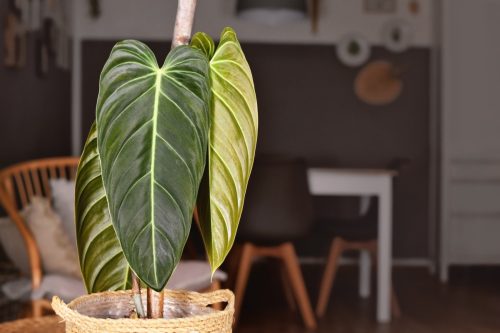
Start out with a philodendron as your first houseplant and you won’t be disappointed, especially if you’re a “lazy” plant lover, Vincent says.
“A slightly trailing plant with heart-shaped leaves, it can withstand serious abuse,” she says. “Philos root quite easily so you can turn one singular plant in a jungle fairly quickly, with very little effort. Check the soil—if it’s partially dry give it a little water, but you can’t really go wrong here.”
When you head to the garden center, you can choose from different varieties, shapes, and sizes, Brandt notes. It shouldn’t be too hard to find either, as it’s one of the more popular houseplant options. Its “heart-leaf vines” can also grow in hanging baskets, if you want those in your home, or a “larger-leaf shrub,” she says.